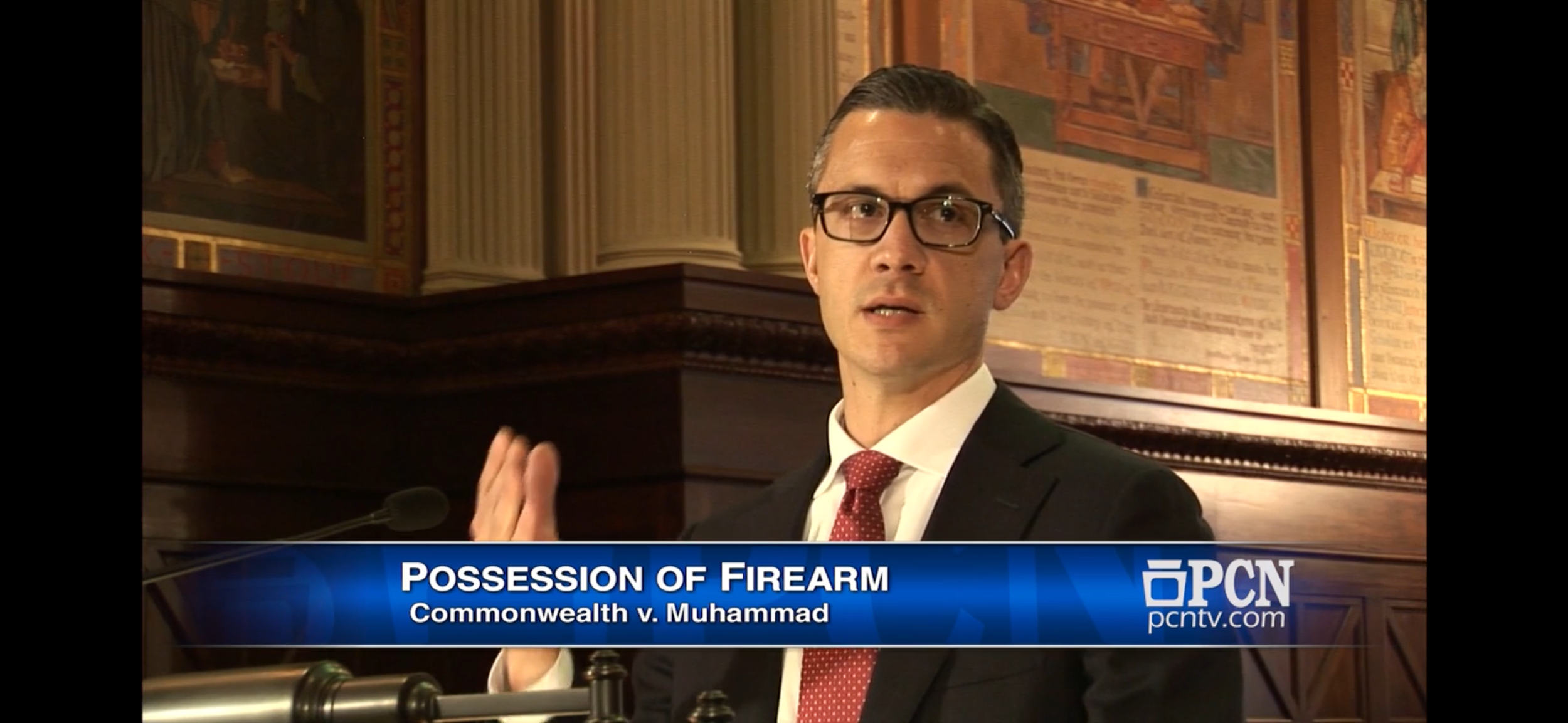
Philadelphia Criminal Defense Blog
Third Circuit: A General Rule 29 Motion Does Not Preserve Specific Sufficiency of the Evidence Arguments for Appeal
Criminal Defense Lawyer Zak T. Goldstein, Esquire
The United States Court of Appeals for the Third Circuit has decided the case of United States v. Abrams, Nos. 24-1998, 24-3003 (3d Cir. 2026), holding that a bare, non-specific motion for judgment of acquittal under Federal Rule of Criminal Procedure 29 does not preserve every sufficiency of the evidence argument a defendant may later want to raise on appeal. This is an important decision for criminal defense lawyers practicing in federal court because it means that if you do not articulate your specific sufficiency challenges at trial, meaning provide the reasons for the sufficiency challenge at time time you move for a new trial or judgment of acquittal in the trial court, you will be limited to plain error review on appeal, which is an extremely difficult standard to meet.
The Facts of United States v. Abrams
The defendant in this case was convicted at a nine-day jury trial on 48 criminal counts, including wire fraud, mail fraud, aggravated identity theft, money laundering, unlawful monetary transactions, obstruction of justice, and making false statements. The charges arose from a scheme in which the defendant solicited investors for his clean energy startup by providing forged documents and false financial information. He then diverted investor funds for personal use, including purchasing a residence in South Carolina. The District Court imposed a 72-month prison sentence and ordered approximately $1.2 million in restitution.
The Rule 29 Motion at Trial
At the close of the government's case, the defendant moved for judgment of acquittal under Rule 29(a). The entire colloquy was remarkably brief:
THE COURT: Now that you are going to rest, are there motions?
DEFENSE COUNSEL: Yes. I move for judgment of acquittal on Rule 29(a). I waive argument.
GOVERNMENT COUNSEL: Subject to the pending stipulation, there's more than enough evidence in the record to justify all 48 counts in the indictment for a myriad of Title 18 offenses.
THE COURT: It's clear that the presentation of evidence so far if believed by the jury would certainly satisfy the government's burden of proof beyond a reasonable doubt, and so the Rule 29 motion is denied.
That was it. The defendant made no specific arguments about which elements of which offenses the government had allegedly failed to prove. He failed to identify any particular weaknesses in the evidence. He simply made a bare motion for an acquittal, with argument expressly waived.
On appeal, the defendant then raised a host of specific sufficiency arguments he had never presented to the trial court, including challenges to whether the government had proven the "money or property" element of fraud and whether the evidence established specific intent to defraud.
The Third Circuit's Holding on Preservation
The Third Circuit held that because Abrams made only a general, non-specific Rule 29 motion, he had not preserved his specific sufficiency arguments for appellate review. The Court applied plain error review instead of the de novo standard that ordinarily applies to sufficiency challenges.
The Court grounded its analysis in United States v. Joseph, 730 F.3d 336 (3d Cir. 2013), which drew a careful distinction between “issues” and “arguments.” Under Joseph, a single “issue” can encompass more than one discrete “argument.” To preserve a specific argument for appeal, a party must raise the same argument, not merely the same broader issue, in the district court. Merely raising an issue that encompasses the appellate argument is not enough.
The Court had previously applied this framework to Rule 29 motions in United States v. Williams, 974 F.3d 320, 361 (3d Cir. 2020), holding that when a Rule 29 motion raises specific grounds, all arguments not raised are unpreserved. But Williams expressly left open the question of whether a broadly stated Rule 29 motion, meaning one that raises no specific grounds at all, preserves all sufficiency arguments. In United States v. Johnson, 19 F.4th 248, 255 n.6 (3d Cir. 2021), the Court reaffirmed that Williams did not hold that a general Rule 29 motion preserves all sufficiency arguments.
In Abrams, the Court squarely decided that open question: a general Rule 29 motion does not preserve all sufficiency arguments later raised on appeal. This holding was driven by two principles of preservation doctrine. First, a party must put the district court “squarely on notice” of the point at issue, giving the court a chance to consider and resolve the matter in the first instance. Second, arguments must be sufficiently particularized and framed as specific arguments because judges “are not clairvoyant” and need not “anticipate and join arguments that are never raised by the parties.”
The Court acknowledged that several other circuits have held (often with little analysis) that a broadly stated Rule 29 motion without specific grounds preserves the full array of sufficiency challenges for appeal. The Third Circuit declined to follow that approach, finding it inconsistent with preservation principles and noting that it would create a perverse incentive for defense lawyers to say as little as possible in the district court in order to save their best arguments for appeal. The Court cited Judge Oldham's concurrence in United States v. Kieffer, 991 F.3d 630, 638-39 (5th Cir. 2021), which observed that this double standard “encourages defendants to say as little as possible in the district court and to save their good arguments as 'gotchas!' for appeal.”
What Happens Under Plain Error Review
Because Abrams had not preserved his sufficiency arguments, the Third Circuit reviewed them only for plain error under United States v. Olano, 507 U.S. 725 (1993). That standard requires a showing that (1) there was an error, (2) the error was plain, (3) the error affected substantial rights, and (4) not correcting the error would seriously affect the fairness, integrity, or public reputation of judicial proceedings. An insufficiency claim succeeds under this standard only where affirmance would produce a '“manifest miscarriage of justice,” meaning the record must be devoid of evidence of guilt or the evidence must be so tenuous that a conviction is shocking. United States v. Burnett, 773 F.3d 122, 135 (3d Cir. 2014). That is an extremely high bar. Unsurprisingly, the Third Circuit found no plain error in Abrams, noting that the evidence of fraud was overwhelming.
Facing Federal Criminal Charges? We Can Help.
Goldstein Mehta LLC Criminal Defense
If you are facing criminal charges or under investigation by the police, we can help. We have successfully defended thousands of clients against criminal charges in courts throughout Pennsylvania and New Jersey. We have successfully obtained full acquittals and dismissals in cases involving charges such as Conspiracy, Aggravated Assault, Rape, and Attempted Murder. Our award-winning Philadelphia criminal defense lawyers offer a free criminal defense strategy session to any potential client. Call 267-225-2545 to speak with an experienced and understanding defense attorney today.
Pennsylvania Superior Court Upholds Admission of Google Maps Timeline Data Without Requiring Expert Testimony
Criminal Defense Lawyer Zak T. Goldstein, Esquire
The Pennsylvania Superior Court has decided the case of Commonwealth v. Jones, holding that the Commonwealth need not call an expert witness to introduce Google Maps timeline data recovered from a defendant’s cell phone. The Court held that no expert is required so long as the testifying witness does not offer their own technical opinion and instead simply replays what the app automatically displays. This decision makes it easier for either side to introduce cell phone location data obtained from various Google apps and records.
The Facts of Jones
At around 2:00 a.m. on June 18, 2024, a masked man robbed a Turkey Hill convenience store in Lancaster County. The store clerk later identified the defendant based on his eyes, dreadlocks, and voice after seeing his Facebook profile. The police obtained a search warrant. After obtaining the warrant, the police seized the defendant’s cell phone and tablet. Both devices were synchronized with and linked to his Google account.
A detective accessed the defendant’s Google Maps “Your Timeline” feature, which automatically logs a user’s past movements when enabled. The Timeline showed:
The defendant leaving home at 1:35 a.m.,
The defendant arriving at a hotel directly next to the Turkey Hill at 1:47 a.m.,
The defendant remaining there until 2:01 a.m., which was the time of the robbery, and
The defendant then traveling to a nearby Sheetz convenience store, where surveillance video confirmed the defendant’s presence.
At trial, the Commonwealth introduced screenshots of the defendant’s Google Maps data through the detective’s testimony. The defendant objected, arguing that an expert witness from Google or a digital forensics specialist was required to explain how the timeline information was generated. The trial court denied the motion, and the jury convicted the defendant of robbery, theft, and simple assault. He received a lengthy state prison sentence.
The Issue on Appeal in the Pennsylvania Superior Court
The defendant argued on appeal that the Google Maps Timeline contained inaccuracies, including suspicious travel distances and impossible driving times, and that only an expert could explain those discrepancies. Therefore, he claimed, allowing the detective to testify as a layperson about the data violated Pennsylvania Rules of Evidence 701 and 702.
The Superior Court’s Holding
The Superior Court affirmed the judgment of sentence, concluding:
Google Maps Timeline data may be introduced through a lay witness when the witness is simply describing the information displayed on the app and is not explaining any underlying technical processes.
The Court emphasized several key points:
1. The detective did not provide technical or scientific testimony. He accessed Google Maps the same way an ordinary user would. He opened the app and clicked “Your Timeline.” He did not testify about how Google calculates GPS coordinates or how the software functions internally.
2. The data was automatically generated by Google, not manually interpreted by police. Because the app itself creates and stores the Timeline, the officer was merely relaying what he saw on the screen, much like reading business records or phone-company logs.
3. Any inaccuracies went to the weight of the evidence, not admissibility. The defendant pointed to anomalies such as a twelve-minute trip to travel 0.2 miles, but the Court held these issues were for the jury to consider, not grounds for exclusion. The detective freely acknowledged the inconsistencies on cross-examination.
4. Lay testimony is proper when interpreting data within common understanding. The Court compared the case to Commonwealth v. Grubbs, where a detective testified to cell-site location data without expert qualification because he merely relayed coordinates already calculated by service providers. In contrast, cases where expert testimony was required, such as interpreting technical IP address data, were distinguishable because they involved complex digital processes. In reality, it is not so clear what the difference is.
This opinion signals that Pennsylvania courts will generally treat Google Maps data as non-technical user data, similar to ordinary phone records, so long as:
The witness does not attempt to explain how the data is generated,
The witness only describes the app’s output, and
The prosecution can authenticate the device and account.
It also underscores that defendants may need their own expert if they wish to challenge the reliability of such location data.
The Takeaway
The Superior Court held that Google Maps GPS Timeline screenshots are admissible through lay testimony, and any questions about their accuracy go to the weight of the evidence, not whether the jury may consider them.
This ruling will likely make it easier for prosecutors to introduce Google-based location evidence in robbery, homicide, and gun cases without needing specialized experts, while placing the burden on the defense to identify and challenge inaccuracies through independent expert analysis when appropriate. It does, however, also make it easier for the defense to introduce this evidence should the evidence be helpful to the defendant. In general, this case follows a trend of courts making it easier for the Commonwealth to introduce electronic evidence without requiring much in the way of safeguards.
Facing criminal charges or appealing a criminal case? We can help.
Goldstein Mehta LLC Criminal Lawyers
If you are facing criminal charges or under investigation by the police, we can help. We have successfully defended thousands of clients against criminal charges in courts throughout Pennsylvania and New Jersey. We have successfully obtained full acquittals in cases involving charges such as Conspiracy, Aggravated Assault, Rape, and Murder. We have also won criminal appeals and PCRAs in state and federal court. Our award-winning Philadelphia criminal defense lawyers offer a free criminal defense strategy session to any potential client. Call 267-225-2545 to speak with an experienced and understanding defense attorney today.
PA Superior Court: Jurisdiction Exists for Out-of-State Access Device Fraud When Complainant Lives in Pennsylvania
Philadelphia, PA Criminal Defense Lawyer Zak T. Goldstein, Esquire
The Pennsylvania Superior Court has decided the case of Commonwealth v. Washington, holding that the Commonwealth could prosecute the defendant for allegedly committing fraud out of state when the complainant and the complainant’s financial accounts were based in Pennsylvania.
The Facts of the Case
In Commonwealth v. Washington, 2025 PA Super 183, the Pennsylvania Superior Court held that Pennsylvania courts have jurisdiction to prosecute access device fraud committed outside the Commonwealth when the complainant resides here and the affected financial account is maintained in Pennsylvania. The Court rejected the defendant’s jurisdictional challenge.
The defendant was charged in Montgomery County, PA with one count of Access Device Fraud under 18 Pa.C.S. § 4106(a)(1)(ii). While physically in New York, the defendant used an altered check and fake identification belonging to a Pennsylvania resident. Using the forged documents, he cashed a counterfeit $3,500 check and withdrew $5,000 from the complainant’s KeyBank account.
The complainant lived in Lower Salford Township in Montgomery County, and KeyBank operated branches there. After the transactions, a New York branch manager contacted the complainant, who confirmed that he had not authorized the withdrawals. Surveillance footage identified the defendant, who was arrested and extradited to Pennsylvania. He pleaded guilty and was sentenced to nine to twenty-three months in jail. On appeal, the defendant argued that Pennsylvania lacked subject-matter jurisdiction and venue because the fraudulent conduct occurred entirely in New York State.
The Superior Court’s Analysis
The Superior Court rejected that argument and affirmed the conviction. Under 18 Pa.C.S. § 102, Pennsylvania courts may exercise jurisdiction if either the conduct constituting an element of the offense or the result of that conduct takes place within the Commonwealth. Access Device Fraud under § 4106(a)(1)(ii) criminalizes using another person’s access device without authorization. The Court held that an essential element of the offense—the failure to obtain the owner’s consent—occurs where the victim resides. Because the complainant lived in Montgomery County, the defendant’s unauthorized use of the complainant’s financial information constituted conduct occurring within Pennsylvania even though the defendant was in New York.
The Court also concluded that venue was proper in Montgomery County under § 4106(e), which provides that such offenses may be deemed committed “at the place where the property or services were received or provided, or at the place where the lawful charges for said property or services are billed.” Because the complainant’s account and the relevant KeyBank branch were located in Montgomery County, that county was the proper venue.
Citing similar reasoning from courts in Massachusetts and Florida, the Superior Court confirmed that Pennsylvania may exercise jurisdiction over out-of-state access device or identity-theft offenses when the complainant resides in Pennsylvania and the loss is tied to a Pennsylvania account.
The Takeaway
Commonwealth v. Washington establishes that Pennsylvania courts can prosecute financial crimes committed elsewhere if the victim lives in Pennsylvania and the affected funds are drawn from a Pennsylvania account. Even remote, out-of-state conduct can support Pennsylvania charges when the harm and loss occur within the Commonwealth.
Facing criminal charges? We can help.
Goldstein Mehta LLC Criminal Defense Attorneys
If you are facing criminal charges or under investigation by the police, we can help. We have successfully defended thousands of clients against criminal charges in courts throughout Pennsylvania and New Jersey. We have successfully obtained full acquittals in cases involving charges such as Conspiracy, Aggravated Assault, Rape, and Murder. We have also won criminal appeals and PCRAs in state and federal court. Our award-winning Philadelphia criminal defense lawyers offer a free criminal defense strategy session to any potential client. Call 267-225-2545 to speak with an experienced and understanding defense attorney today.
Third Circuit: Obstruction Enhancement Must Be Supported by Actual Evidence at Sentencing
Philadelphia Criminal Defense Lawyer Zak T. Goldstein, Esquire
The United States Court of Appeals for the Third Circuit recently issued a decision in United States v. Soto, vacating the sentence of a federal robbery defendant and remanding the case for resentencing due to an improperly applied obstruction of justice enhancement. The Court found that the government failed to introduce actual evidence at sentencing to support the enhancement and that the defendant’s alleged conduct, even if supported by the evidence, did not show an intent to obstruct the proceedings.
The Facts of Soto
The defendant was convicted of multiple charges stemming from two armed bank robberies in New Jersey. The charges included conspiracy to commit bank robbery (18 U.S.C. § 371), bank robbery (18 U.S.C. § 2113(a)), and using and carrying a firearm during and in relation to a crime of violence (18 U.S.C. § 924(c)). At sentencing, the district court applied a two-level enhancement for obstruction of justice under USSG §3C1.1, citing three alleged incidents:
The defendant entered an elevator with jurors and asked one to press a button for him.
The defendant greeted victims on the steps of the courthouse before they testified.
The defendant allegedly interacted with a co-defendant's brother while attending a family event which the government had given him permission to attend.
At sentencing, the district court determined that the offense level was 29 and sentenced the defendant to 289 months in federal prison. The sentence included two mandatory and consecutive seven-year terms for the firearms charges. The defendant appealed, arguing that the district court should not have applied the obstruction enhancement.
The Third Circuit's Decision
The Third Circuit agreed with the defendant, reversed the decision of the district court, and vacated his sentence. The Third Circuit concluded that the district court erred in applying the enhancement for several reasons:
1. Lack of Evidence Supporting the Alleged Obstruction
The Court emphasized that an obstruction of justice enhancement requires proof that the defendant acted “willfully” with the specific intent to obstruct or impede the administration of justice. In the defendant’s case:
Elevator Interaction: The court found no evidence of the defendant’s intent to influence or intimidate the jurors from the fact that he got on the elevator with jurors. While two jurors reported feeling uncomfortable, the majority were unfazed or did not even notice the interaction. The Court characterized the defendant’s actions—asking a juror to press a button—as an ordinary interaction which failed to show any obstructive intent.
Greeting Victims: The Court noted that the government’s claim that Soto greeted victims as they entered the courthouse was unsupported by testimony or reliable evidence. Defense counsel maintained that the defendant merely said “good morning” to people passing by on the courthouse steps one morning. He did not threaten anyone or say anything about the case.
Interaction with a Co-Defendant’s Brother: The government alleged that the defendant approached the brother on the street, but it did not introduce any actual evidence to support this claim. The defendant denied that this interaction occurred and objected, and the district court failed to hear any evidence on the allegation or make factual findings on this incident.
2. Due Process Violations
The Third Circuit also emphasized that the lower court violated the defendant’s due process rights because the court relied on unsubstantiated allegations without hearing any supporting evidence. Although the government referenced surveillance footage and FBI interviews, these materials were not part of the record from sentencing. Therefore, because the defense objected to the pre-sentence report, the district court could not rely on the allegations. Where the defense does not object to the PSR, then the district court may assume the statements in the PSR are true. But where the defense contests their validity, due process requires that the government prove factual allegations in the pre-sentence report.
3. Misapplication of the Guidelines
The obstruction of justice enhancement penalizes deliberate attempts to interfere with the judicial process. The Third Circuit criticized the district court for focusing on the consequences of the defendant’s actions (e.g., discomfort among jurors and the need for voir dire) rather than on whether the defendant acted with the intent to obstruct justice. Without evidence of willful obstruction, the enhancement was unwarranted and led the defendant to receive a worse sentence than he would have had it not been applied. Accordingly, the Court remanded for a new sentencing hearing.
This decision highlights several critical points for federal sentencing hearings.
Strict Evidentiary Standards at Sentencing: Prosecutors bear the burden of proving enhancements by a preponderance of the evidence, and sentencing courts may only apply enhancements where the evidence in the record supports the enhancement.
Intent Matters: The obstruction of justice enhancement under §3C1.1 applies only when the defendant acts with deliberate intent to obstruct justice. Mere inappropriate or inadvertent behavior does not suffice. Lawyers may know to stay far away from jurors, but a criminal defendant may not know that saying hi or getting on an elevator could be a problem.
Protecting Due Process: Defense counsel should object to unsupported allegations at sentencing in order to fight for a lower sentence and to preserve the record for appeal.
Facing criminal charges or appealing a criminal case in Pennsylvania? We can help.
Goldstein Mehta LLC Criminal Defense Attorneys
If you are facing criminal charges or under investigation by the police, we can help. We have successfully defended thousands of clients against criminal charges in courts throughout Pennsylvania and New Jersey. We have successfully obtained full acquittals in cases involving charges such as Conspiracy, Aggravated Assault, Rape, and Murder. We have also won criminal appeals and PCRAs in state and federal court, including the exoneration of a client who spent 33 years in prison for a murder he did not commit. Our award-winning Philadelphia criminal defense lawyers offer a free criminal defense strategy session to any potential client. Call 267-225-2545 to speak with an experienced and understanding defense attorney today.











